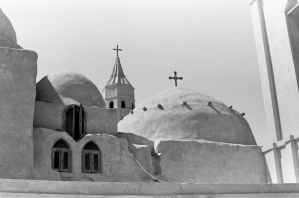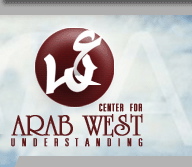
The Middle Eastern countries are a paradise of colourful fantasies. Egypt crowns them all. Just spend an evening with Egyptian Christians, and Biblical miracles fade into insignificance when compared to stories of miracles in Egypt today. With each narration of an old or new miracle, the atmosphere becomes more charged.
A classic story is about the success of Christian prayers to relocate the Muqattam mountains near Cairo after the caliph had demanded proof that the Christian faith could move mountains, although no record of such a miracle has been found in documents from the period in which it supposedly took place. Another story relates that during a wedding ceremony, a saint (St. Ibscharun) moved a church 600 kilometers to another village.
Throughout the centuries, Egypt has witnessed a long procession of patron saints who rose, glittered and vanished, and visions of the Virgin Mary are frequently reported by both Muslims and Christians.
Yet when there are tensions between Christians and Muslims, the same religious images can develop into a stream of poisonous lies, embellishments and accusations, often published in the Western press.
For the Cairo-based Dutch sociologist, Kees Hulsman, this is a source of great concern. He is married to an Egyptian woman and is a member of the Coptic Orthodox Church. He witnessed the way in which incorrect information and pervasive rumours were leading to a deterioration of societal relations.
He and his wife, Sawsan, decided to act, building a large archive of reports about Muslim-Christian relations, published in the Egyptian press. Their efforts have been supported by Bishop Marqus (Coptic Orthodox), Bishop Qulta (Coptic Catholic), Dr Abd al-Mu’ti Bayyoumi, Bishop Munir (Episcopal), and many others.
Hulsman concludes that their mission is to ‘[seek] facts in a place where anti-fact culture is widespread.’ Tens of articles are selected and summarised in English by a changing staff, and the resulting Arab-West Report is sent weekly via e-mail to subscribers, including embassies. Sometimes, staff of the Arab-West Report add their own research, and for a fee, the complete translations of original Arabic texts are available.

The intention is that in about a year, on the website of the Centre for Arab-West Understanding (CAWU), to be officially launched in May 2006, an electronic documentation centre will be available, making the unique collection accessible to scholars, journalists, diplomats and other interested people. Former Dutch Prime Minister Andreas van Agt, co-chairman of the International Ethical Collegium, has agreed to launch CAWU and its website on 7 and 8 May 2006.
Yet now Kerk-in-Actie (Church in Action) of the Protestant churches in the Netherlands has withdrawn its financial support, due to falling incomes from dwindling congregations; at the same time, there were budget cuts in a number of other programmes. This puts into jeopardy the deadline for the Electronic Documentation Centre, which was supported by Kerk-in-Actie, but has not yet been completed.
The Dutch Ministry of Development Cooperation is generous in funding projects that encourage inter-religious dialogue, but although Hulsman’s project is low-cost and provides a solid basis of facts for dialogue, it has not yet received any financial support. Development Cooperation prefers to help organisations that have NGO (non-governmental organisation) status. But to obtain this, Hulsman and those supporting him depend on the various departments of the Egyptian government.
Some, but not all, Egyptian officials realise how important it is to fight fantasies with fact. For the time being, Arab-West Report functions under the status of a normal company. Relocating to Cyprus, where the rules are much more flexible, would drive up expenses too much.
Hulsman notes another problem: ‘This is a private initiative. Financiers find this strange.’ If everything succeeds, it would be the tribute to a lifetime’s work. Hulsman developed a great interest in the Middle East, and a special interest in Christian minorities, during his student days. To understand such issues requires knowledge of Islam, and Hulsman developed a relationship with the Azhar University, the most important theological institution in the Muslim world.
As a journalist, Hulsman learnt first-hand how easy it is to write ‘atmosphere stories’, but how difficult it is to obtain reliable facts.
An example was the riots in the village of al-Koshh in 1998, when a local priest accused a Muslim family of murdering a Christian. Hulsman was one of the few Western journalists who visited the village.
He found little appreciation for his efforts to nuance Western reporting; some media had reported that Christians were crucified. Furthermore, his conclusions that the man had been murdered during a fight amongst a small group of Christians, who were drinking and gambling, was not well received. Hulsman lost clients from Christian publications, particularly in the United States, resulting in a loss of income.
He describes the system: ‘Organisations that support Christians need money. Nuance is not good for fundraising. They score better with outright “persecution of Christians”.’ Hulsman adds: ‘Discussions with representatives of different Christian organisations sometimes showed internal tensions between their public relations departments, and those working in the field.’
Hulsman has also received requests for dramatic stories of persecution, which he was told would benefit not only Hulsman himself, but also the church.
The US Copts Association, comprising Coptic immigrants to the United States, plays a major lobbying role, and the association has used its good connections with American senators to plead for sanctions against Egypt. That, in turn, makes Egyptian tabloids fulminate against American Copts. Hulsman comments: ‘It is a small group of some 10-15 senators who systematically support the claims of US Copts. The same group also seems to be staunch supporters of Israel. Several prominent diplomats at the US Embassy in Cairo noted the same phenomenon, but could, of course, not speak publicly.’
Hulsman goes on, ‘… there is often a kernel of truth. Of course the police used excessive force in al-Koshh (al-Koshh is around half Christian and half Muslim), this is standard policy, also in predominantly Muslim villages. It is true that Christians have difficulty obtaining permits for new churches. There is discrimination. But many problems can be solved through good relations; however, these relations are being harmed, making it more difficult to find solutions.’
The last major riot was in October in Alexandria [this article was written before the more recent incidents in Alexandria]. A video, produced in a church, showed a play in which a young man regrets his conversion to Islam. The actors in this play were all Christian.
Members of the Muslim Brotherhood got hold of the video and exploded with anger. The police placed a cordon around the church where the recording was made when they heard a demonstration had been planned. After this, demonstrators attacked smaller churches, and though in most cases their attack was limited to banging on the shutters, the Pentecostal church was severely damaged by hundreds of people.
This riot was later reformulated by the American-Coptic exaggeration machine; the number of Muslim demonstrators was multiplied tenfold, becoming thirty thousand, and it was claimed that all the Christian shops in the area were torched. According to Hulsman, who went to Alexandria to look for himself, this claim is not true. Except for the Pentecostal church, where the damage was indeed serious, he and other Christians who went there to inquire saw little damage.
The history of the Copts, whose influence has withered over the centuries, plays an important background role. When the Muslims conquered Egypt in the seventh century, almost all the country’s inhabitants were Christian. Christians today only number some eight per cent of Egyptians, and they have seen their influence decrease.
Extremist attacks in the 1980s and 1990s on Christian jewelers and pharmacists only made the situation worse. The Coptic Church seems to have chosen to be assertive, and is aligning itself with the powerful Western outside world. Hulsman fears that this pro-Western strategy is breeding so much ill will that it could prove fatal in the long run. Hulsman explains: ‘Examples are the media publicity generated around the problems between the Convent of Patmos and a neighbouring army unit (1997-2004), and a wall built near the Coptic Orthodox Monastery of Antonius (2004). There have been problems, but local church authorities have resorted to alarming Coptic activists in the West, and these activists used such problems to get maximum publicity.’
Hulsman’s endeavours have been met with little gratitude. A Christian Internet site claimed that he gets a top salary from the Egyptian secret service. Extremist Muslims attacked him on a mini-website. One of the participants cautioned all those advocating dialogue.
Hulsman nevertheless remains convinced that machines of exaggeration, whether they are run by Christians or Muslims, need to be sabotaged. He finds personal threats far less threatening than the potential disaster lying in wait for one of the oldest Christian communities in the world.
Eildert Mulder
© Trouw 2005. This article was originally published in the Dutch newspaper Trouw on 1 December 2005, available at http://www.trouw.nl. The copyright remains with Trouw and the author. The English translation was done by Kees Hulsman and Elizabeth Yell of CAWU. The article was slightly edited by Religioscope for an international audience, with the permission of the author and translators. Published by Religioscope with permission. This article cannot be republished without first getting written permission from Trouw and CAWU.
The Centre for Arab-West Understanding (CAWU), based in Egypt, publishes Arab-West Report, a weekly English language electronic overview of articles published in the Egyptian press. The centre is also building a searchable electronic documentation centre of around 12,000 translated articles and special reports on issues related to Muslim-Christian, Arab-West understanding. For more information about subscriptions or CAWU itself, see http://www.cawu.org.
CAWU meanwhile is seeking financial support to keep its work going.